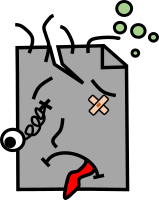Update on jpylyzer
Introduction
In this blog post I will give a brief update of the latest jpylyzer developments. Jpylyzer is a validation and feature extraction tool for the JP2 (JPEG 2000 Part 1) still image format.
History of jpylyzer
Around mid-summer 2011, the KB started initial preparations for migrating 146 TB of TIFF images from the Dutch Metamorfoze program to JP2. We realised that the possibility of hardware failure (e.g. short network interruptions) during the migration process would imply a major risk for the creation of malformed and damaged files. Around the same time, we received some rather worrying reports from the British Library, who were confronted with JP2 images that contained damage that couldn’t be detected with existing tools such as JHOVE.
This prompted me to have a go at writing a rudimentary software tool that was able to detect some simple forms of file corruption in JP2. A blog post I wrote on this resulted in quite a bit of feedback, and several people asked about the possibility to extend the tool’s functionality to a full-fledged JP2 validator and feature extractor. Since this fitted in nicely with some SCAPE work that was envisaged on quality assurance in imaging workflows, I started work on a first prototype of jpylyzer, which saw the light of day in December.
In the remainder of this blog post I will outline the main developments that have happened since then.
Refactoring of existing code
Shortly after the release of the first prototype, my KB colleague René van der Ark spontaneously offered to do a refactoring job on my original code, which was clumsy and unnecessarily lengthy in places. This has resulted in a code that is more modular, and which adheres more closely to established programming practices. As a result, the refactored code is significantly more maintainable than the original one, which makes it easier for other programmers to contribute to jpylyzer. This should also contribute to the long-term sustainability of the software.
New features
Since the first prototype the following functionality was added to jpylyzer:
- New validator functions were added for XML boxes, UUID boxes, UUID Info boxes, Palette boxes and Component Mapping boxes.
- A check was added that verifies whether the number of tiles in an image matches the image- and tile size information in the codestream header.
- Another check was added that verifies whether all tile-parts within each tile exist.
- The ICC profile feature extraction function has been given an overhaul, and it now extracts all ICC header items. In addition, the output is now reported in a more user-friendly format.
- For codestream comments, all characters from the Latin character set are now supported.
- The reporting of the validation results has been made more concise. By default, jpylyzer now only reports the results of validation tests that failed (previously all test results were reported). This behaviour can be overruled with a new –verbose switch.
In addition to the above, various bugs and minor issues have been addressed as well.
Debian packages
During the SCAPE Braga meeting in February, work started on the creation of Debian packages for jpylyzer. The availability of Debian packages greatly simplifies jpylyzer’s installation on Linux-based systems. This work was done by Dave Tarrant (University of Southampton), Miguel Ferreira, Rui Castro, Hélder Silva (KEEP Solutions) and Rainer Schmidt (AIT).
Jpylyzer now hosted by OPF
In order to make a tool sustainable, it is important that its maintenance and development are not solely dependent on one single institution or person. Because of this, jpylyzer is now hosted by the Open Planets Foundation, which ensures the involvement of a wider community. Jpylyzer also has its own home page on the OPF site. It contains links to the source code, Windows executables, Debian packages and the User Manual.
Jpylyzer home page
http://jpylyzer.openpreservation.org/
Originally published at the Open Preservation Foundation blog
-
JP2
- Generating lossy access JP2s from lossless preservation masters
- Jpylyzer 2015 round-up
- Response to report on JPEG 2000 expert round table
- Six ways to decode a lossy JP2
- Jpylyzer software finalist voor digitale duurzaamheidsprijs
- Optimising archival JP2s for the derivation of access copies
- ICC profiles and resolution in JP2: update on 2011 D-Lib paper
- Automated assessment of JP2 against a technical profile
- Update on jpylyzer
- Jpylyzer documentation
- A prototype JP2 validator and properties extractor
- A simple JP2 file structure checker
- Paper on JPEG 2000 for preservation
- Ensuring the suitability of JPEG 2000 for preservation
-
jpeg-2000
- Generating lossy access JP2s from lossless preservation masters
- Jpylyzer 2015 round-up
- Response to report on JPEG 2000 expert round table
- Six ways to decode a lossy JP2
- Jpylyzer software finalist voor digitale duurzaamheidsprijs
- Optimising archival JP2s for the derivation of access copies
- ICC profiles and resolution in JP2: update on 2011 D-Lib paper
- Automated assessment of JP2 against a technical profile
- Update on jpylyzer
- Jpylyzer documentation
- A prototype JP2 validator and properties extractor
- A simple JP2 file structure checker
- Paper on JPEG 2000 for preservation
- Ensuring the suitability of JPEG 2000 for preservation
-
jpylyzer
- Generating lossy access JP2s from lossless preservation masters
- Jpylyzer 2015 round-up
- Jpylyzer software finalist voor digitale duurzaamheidsprijs
- Adventures in Debian packaging
- Automated assessment of JP2 against a technical profile
- Update on jpylyzer
- Jpylyzer documentation
- A prototype JP2 validator and properties extractor
- A simple JP2 file structure checker


Comments